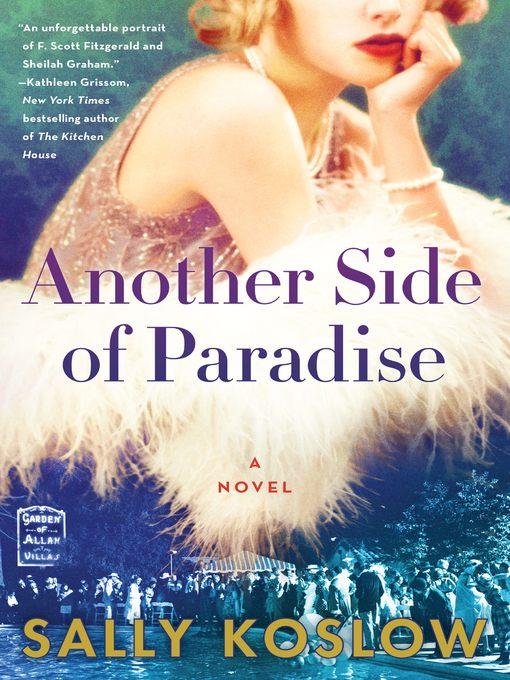
Another Side of Paradise
A Novel
کتاب های مرتبط
- اطلاعات
- نقد و بررسی
- دیدگاه کاربران
نقد و بررسی

February 15, 2018
Koslow's (The Late, Lamented Molly Marx; Little Pink Slips) latest presents a fictionalized account of F. Scott Fitzgerald's love affair with Sheilah Graham, who is confident, secure in her sexuality, and a more than a little ruthless when it comes to her career. Graham successfully distances herself from her orphanage-ridden childhood, lack of education, and failed first marriage by creating a dynamic persona as a celebrity columnist in 1930s Hollywood. As her career takes off, she meets Fitzgerald, who has been nearly forgotten by his reading public. The dichotomy between their ambitions and their hearts fuels their love story, which is all-consuming, full of contradictions, and overshadowed by Fitzgerald's alcoholism and marriage to Zelda. Graham is always jockeying her contrary appetites, making her concern and support of Fitzgerald's perpetual and always-around-the-corner literary comeback seem insincere. Even after she reveals her deepest secrets to him, it's hard to sympathize with her choices, past and present, as the couple's cycle of writing, fighting, and passion continues. VERDICT Fitzgerald fans might enjoy this fictional take on his life, but the rest of this "forgive me for loving a drunk" tale offers nothing new. Readers might be better off with Graham's own memoir, Beloved Infidel.--Tina Panik, Avon Free P.L., CT
Copyright 2018 Library Journal, LLC Used with permission.

March 19, 2018
Koslow (The Widow Waltz) takes on the tumultuous affair of ambitious Hollywood gossip columnist Sheilah Graham and literary lion F. Scott Fitzgerald in this dishy interpretation of Graham’s memoir, Beloved Infidel. Here, Koslow plays off the “weakness and self-deception” of British expat Graham, who reinvents herself in America to hide a poverty-stricken childhood in a London Jewish orphanage and a sexless first marriage to a salesman. Fitzgerald, who comes to Hollywood to reignite his writing career while battling alcoholism, is preoccupied with thoughts about his mentally ill wife, Zelda, and his own fading fame. Though generously peppered with the big names and gossip of the 1930s, the narrative is driven by the tortured relationship between Graham and Fitzgerald in which both succumb to the worst in each other. This version aims to excuse and soften Graham’s unrepentant opportunism—“telling lies” is “no harder than breathing,” she says. And it plays up a version of Fitzgerald as a diligent craftsman and mentor rather than as a mean and abusive drunk. Koslow may be rewriting a feel-good version of the Graham-Fitzgerald romance, but it’s an intoxicating one.

March 15, 2018
Gossip columnist Sheilah Graham's side of her less-than-paradisiacal love affair with F. Scott Fitzgerald during the last three years of his life.Koslow's portrayal begins with Sheilah's refusing to accept the fact that Scott has just died. Flashbacks form the rest of the novel, narrated by Sheilah. Born to a poor Jewish family in London, Sheilah (nee Lily Shiel) is consigned to an orphanage by a mother unable to care for her, but she eventually attains enough respectability to attract upper-class suitors. She marries the much older John Graham Gillam, who is more mentor than husband--they will divorce amicably--and with his blessing achieves a measure of acclaim on the London stage before journeying to America to pursue a career in journalism. Her penchant for fluff pieces lends itself perfectly to gossip, and soon Sheilah's in Hollywood, challenging Louella Parsons and Hedda Hoper. The story of Sheilah and Scott's instant chemistry and their on-again, off-again, but always intense liaison is told with taste and sympathy for these deeply flawed characters: Scott, whose best intentions are always derailed by his frequent tumbles off the wagon, and Sheilah, who grows increasingly weary of concealing her déclassé origins, real name, and Jewishness. She's not entirely reassured when Scott points out that most of Hollywood's movie moguls are Jewish and that the majority of movie stars have what he refers to as a "nom de guerre." As Scott tries to improve on Sheilah's education with a Western canon reading list, she acts as his personal manager, remediating the chaotic aftermath of his drinking bouts. Scott's bad luck as a screenwriter is entertainingly depicted as he's fired from such iconic films as Gone with theWind (despite Sheilah's help with visualizing the character of Scarlett) and The Women. Koslow's writing is vibrant and colorful, and the denizens of Scott's world are ably summed up in a few pithy swipes: "In 1935, Dorothy [Parker] was a wicked, eyelash-batting pixie willing to catapult into any conversation."A stylish reiteration of a sad, oft-told tale.
COPYRIGHT(2018) Kirkus Reviews, ALL RIGHTS RESERVED.

April 15, 2018
When Sheilah Graham meets F. Scott Fitzgerald, he is still married to the institutionalized Zelda, and his brilliant career has sunk into obscurity. But the two hit it off immediately, and begin an intense love affair. Sheilah is new to Hollywood journalism, and she's kept quiet about her childhood of deprivation, striving to remake herself like Scott's character Gatsby. Scott sees star potential in her and embarks on a plan to correct her lack of education. He also looks to her for the vigor he needs to resuscitate his writing. But a drinking binge is never far away, and each immersion makes him more abusive. While Sheilah finds it increasingly difficult to forgive Scott, it is even more difficult for her to leave him; nothing, not the storms of scandal or the danger of violence, will tear her away from him until his death. Koslow (The Widow Waltz, 2013) draws on primary sources to lend authenticity to this romantic yet disturbingly rough relationship in a novel that will attract high interest with its iconic subjects.(Reprinted with permission of Booklist, copyright 2018, American Library Association.)

























دیدگاه کاربران